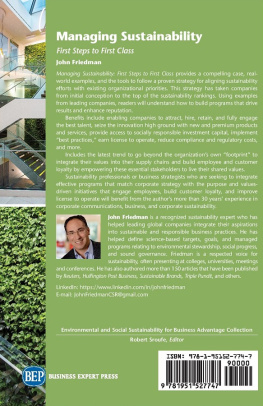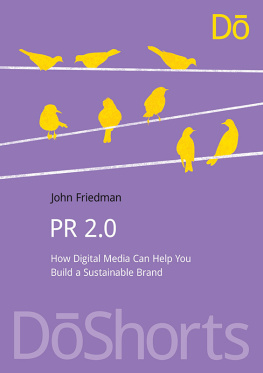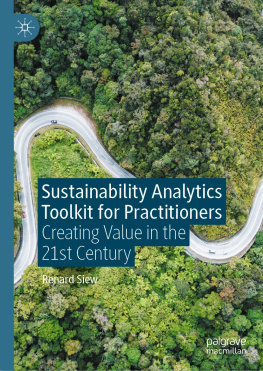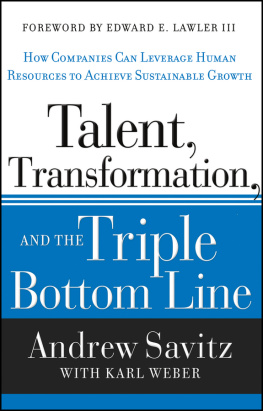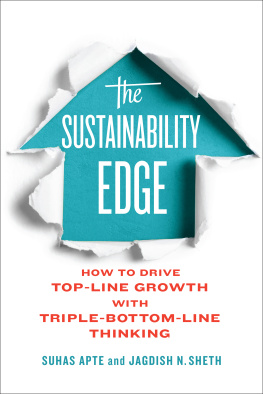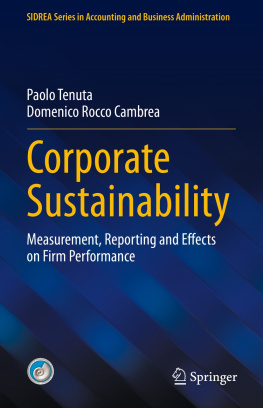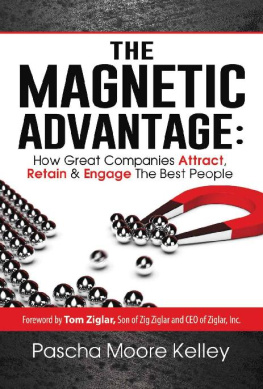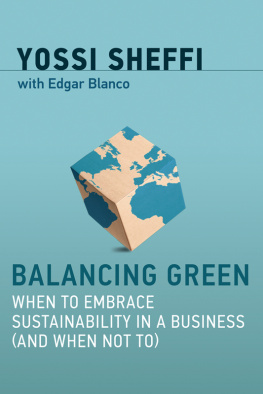Managing Sustainability
Managing Sustainability
First Steps to First Class
John Friedman

Managing Sustainability: First Steps to First Class
Copyright Business Expert Press, LLC, 2020.
All rights reserved. No part of this publication may be reproduced, stored in a retrieval system, or transmitted in any form or by any meanselectronic, mechanical, photocopy, recording, or any other except for brief quotations, not to exceed 250 words, without the prior permission of the publisher.
First published in 2020 by
Business Expert Press, LLC
222 East 46th Street, New York, NY 10017
www.businessexpertpress.com
ISBN-13: 978-1-95152-774-7 (paperback)
ISBN-13: 978-1-95152-775-4 (e-book)
Business Expert Press Environmental and Social Sustainability for Business Advantage Collection
Collection ISSN: 2327-333X (print)
Collection ISSN: 2327-3348 (electronic)
Cover photo courtesy of Interior Plantscapes, Laurel, MD
Cover and interior design by S4Carlisle Publishing Services Private Ltd., Chennai, India
First edition: 2020
10 9 8 7 6 5 4 3 2 1
Printed in the United States of America.
Abstract
Sustainability professionals or business strategists who are seeking to integrate effective programs that match corporate strategy with the purpose and values-driven initiatives that engage employees, build customer loyalty, and improve license to operate will benefit from the authors more than 30 years experience in corporate communications, business, and corporate sustainability.
Managing Sustainability: First Steps to First Class provides a compelling case, real-world examples, and the tools to follow a proven strategy for aligning sustainability efforts with existing organizational priorities. This strategy has taken companies from initial conception to the top of the DJSI/RobecoSAM and MSCI sustainability rankings in three very different business sectors: construction, materials, food services and facilities management, and energy. Using examples from these and other leading companies, readers will understand the importance of creatingand more importantly how to buildprograms that drive results and enhance reputation.
Benefits include enabling companies to attract, hire, retain, and (most importantly) fully engage the best talent, seize the innovation high ground with new and premium products and services, provide access to an ever-increasing pool of socially responsible investment capital, implement best practices, earn social license to operate, reduce compliance and regulatory costs, and more.
The methodology described includes the latest trend (and increasing expectation) to go beyond the organizations own footprint to integrate their values into their supply chains and build employee and customer loyalty by empowering these essential stakeholders to live their shared values.
Keywords
business strategy; strategic alignment; sustainability; corporate responsibility; best practices; organizational excellence; results; reputation; leadership; management; employee engagement; environment; social; governance; ESG; sustainable development goals, SDGs
Contents
Foreword
Our home, planet Earth, is roughly four and a half billion years old. When we, as human beings, think about our lives, our work, our legacy, and those who will come after us, we like to imagine that this world will go on forever. We hope that an infinite number of generations will continue to come along and enjoy the same beauty, the same prosperity, and the same expectations of a better future brimming with wonderful possibilities.
That vision is at the heart of sustainability.
In this book, Managing Sustainability: First Steps to First Class , author John Friedman examines the role of business in forging such a world.
A practitioner of the aspiring art of corporate social responsibility, Friedman takes a no-nonsense look at the several meanings of sustainability in the commercial sector. After all, making money, growing a customer base, and, at the heart of it all, staying in business are the very core of sustainability in the business world.
However, in a larger sense, people today believe that the vision of a sustainable future includes them. It is an expectation of societies around the world, written into law by governments everywhere. Business is duty bound to be a proper steward of social fairness, equal opportunity, and environmental responsibility. We expect our executives to be examples of moral rectitude. Just ask any (former) higher-up out of work for reasons of personal conduct, especially in the #MeToo era.
What the author addresses so articulately in this book is the necessary next step that follows from corporate social responsibility, that is, creating shared value.
Those of us who teach business in the 21st century tell our students thatyesit is your imperative to make money and stay in business. But it is also an imperative to preserve and enhance the world from which you draw your wealth.
That obligation, this new sustainability, includes principles of fairness, expanded opportunity for striving peoples fighting obstacles of disadvantage of all kinds, and, so importantly, preserving and raising the quality of our home, planet Earth.
Louise L. Schiavone
Johns Hopkins University Carey Business School
Baltimore, MD
CHAPTER 1
Introduction
Corporate Sustainability
For many people the concept of sustainabilitymeeting the needs of this generation while safeguarding those of generations to comeis synonymous with environmental protection and stewardship. However, those working in the space focus on three main pillars: economic, environmental, and social. This is what starts to separate an effort to balance or meet all three needs with environmentalism.
For businesses, the term corporate sustainability is broken into three related but slightly different categories: environment, social, and governance (ESG)the concept being that much of what a business does economically has to be done ethically, transparently, and with proper checks and balances in place. For the purposes of this book, the term sustainability relies on the later definition because it is also focused on the need for the business to sustain, as well as the environment and the societies/communities in which it operates.
One need only to look back a decade to the Great Recession and the collapse of the global housing market to see an example of unsustainable economic business practices. There were many reasons for the collapse, which was primarily caused by a rise in subprime mortgage lending (selling housing loans to people with poor credit) and a massive increase in housing prices. Riding the wave up were financial institutions, regulators, credit agencies, and consumers (who did not want to miss out on easy credit and often did not understand the terms of the loans that they were being sold) as well as those who took advantage of the easy money to be made by buying and selling (flipping) houses while prices spiraled upward.
In 2015, the Environmental Protection Agency (EPA) discovered that Volkswagen had been cheating in emissions tests by intentionally programming some of its vehicles to activate their emissions controls only during emissions testing, but to release up to 40 times the legal limits during real-world driving. The EPA determined that the cheating affected about 500,000 cars in America and 11 million worldwide. Regulators in multiple countries began to investigate the company and its stock price fell in value by a third in the days immediately after the news. Volkswagen Group CEO Martin Winterkorn resigned. Volkswagen announced plans in April 2016 to spend 16.2 billion (US$18.32 billion) to refit the affected vehicles as part of a recall campaign. In 2017, Volkswagen pleaded guilty to criminal charges and the company was ordered to pay a $2.8 billion criminal fine.

